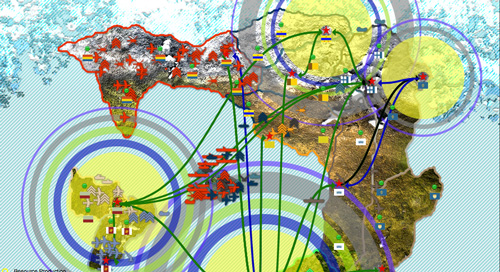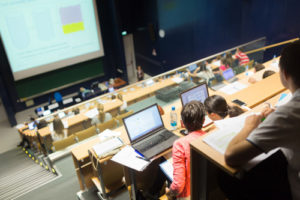Launching a Career in International Affairs
THIS GUIDE IS NO LONGER ACTIVE. For the current FP Guide, click here.
Statecraft Simulations
In international relations courses for undergraduates, faculty at a growing number of colleges and universities are supplementing topics covered in texts, lectures, and class discussions with a cutting-edge learning tool: Statecraft Simulations.
“Students take it very seriously,” says Joseph Bock, director of the School of Conflict Management, Peacebuilding and Development at Kennesaw State University, who uses Statecraft’s International Relations Simulations in an introductory course for international affairs majors. His class of 25 students breaks into six teams, with each team representing a country. The teams choose a name for their country and select a political system: dictatorship, communism, or capitalist democracy. They confront complex challenges, such as global warming and the need to deal with a foreign power that amasses a lot of wealth and becomes dominant. “Questions involving balance of power become real,” says Bock.

“Statecraft is a highly engaging, realistic simulation game. While increasing student engagement, it also reduces instructor prep time.” – Joe Jaeger, CEO, Statecraft Simulations
Outside of class, students write memos, set policies, and propose treaties using Statecraft software. “A lot of the work is done online, but as in real diplomacy, facetime matters,” says Bock. In addition to twice-a-week class meetings, the student teams meet weekly. Students engage in policymaking as they learn to balance their country’s economic, environmental, and defense needs. They can choose which types of energy to use and how much to spend on infrastructure, security, espionage, or global relations.

Statecraft Simulations Interaction Map
“It’s a highly engaging, realistic simulation game,” says Joe Jaeger, CEO of Statecraft Simulations. “While increasing student engagement, it also reduces instructor prep time.” Jaeger has long been a fan of computer-based strategy games and their potential as learning tools. In 2009, he founded Digital World Construction, LLC (now Statecraft Simulations, LLC) with two friends, Adam Simmons and Sam Smith. Jaeger had learned about a spreadsheet-based simulation called Statecraft developed earlier by Jonathan Keller, a professor of political science at James Madison University (JMU).
 “Statecraft was the most fun class activity I experienced at JMU,” says Jana Jamail, Jaeger’s sister. “The situations I was constantly facing helped me understand course concepts and had a major impact on my confidence in critical decision making and leadership.” Jamail connected Jaeger with Keller, who agreed to partner and publish Statecraft as an online simulation.
“Statecraft was the most fun class activity I experienced at JMU,” says Jana Jamail, Jaeger’s sister. “The situations I was constantly facing helped me understand course concepts and had a major impact on my confidence in critical decision making and leadership.” Jamail connected Jaeger with Keller, who agreed to partner and publish Statecraft as an online simulation.
Statecraft Simulations have been used at more than 245 universities, including the University of Michigan, Notre Dame, Texas A&M, and King’s College London.
At Kennesaw State University, Bock credits Statecraft’s International Relations Simulations with helping to make abstract concepts realistic for students and strengthening their skills in team-building, strategy, and problem-solving. “I think interactive learning with this kind of simulation is the wave of the future in undergraduate and graduate education,” he says, “especially for skills-oriented courses.”
For more information see the Program Directory
Contents
- Launching a Career in International Affairs
- New York University School of Professional Studies (NYUSPS), Center for Global Affairs (CGA)
- Georgetown University, Walsh School of Foreign Service (SFS)
- UC San Diego, School of Global Policy and Strategy (GPS)
- Johns Hopkins University (JHU), School of Advanced International Studies (SAIS)
- The Fletcher School of Law and Diplomacy at Tufts University
- Statecraft Simulations

